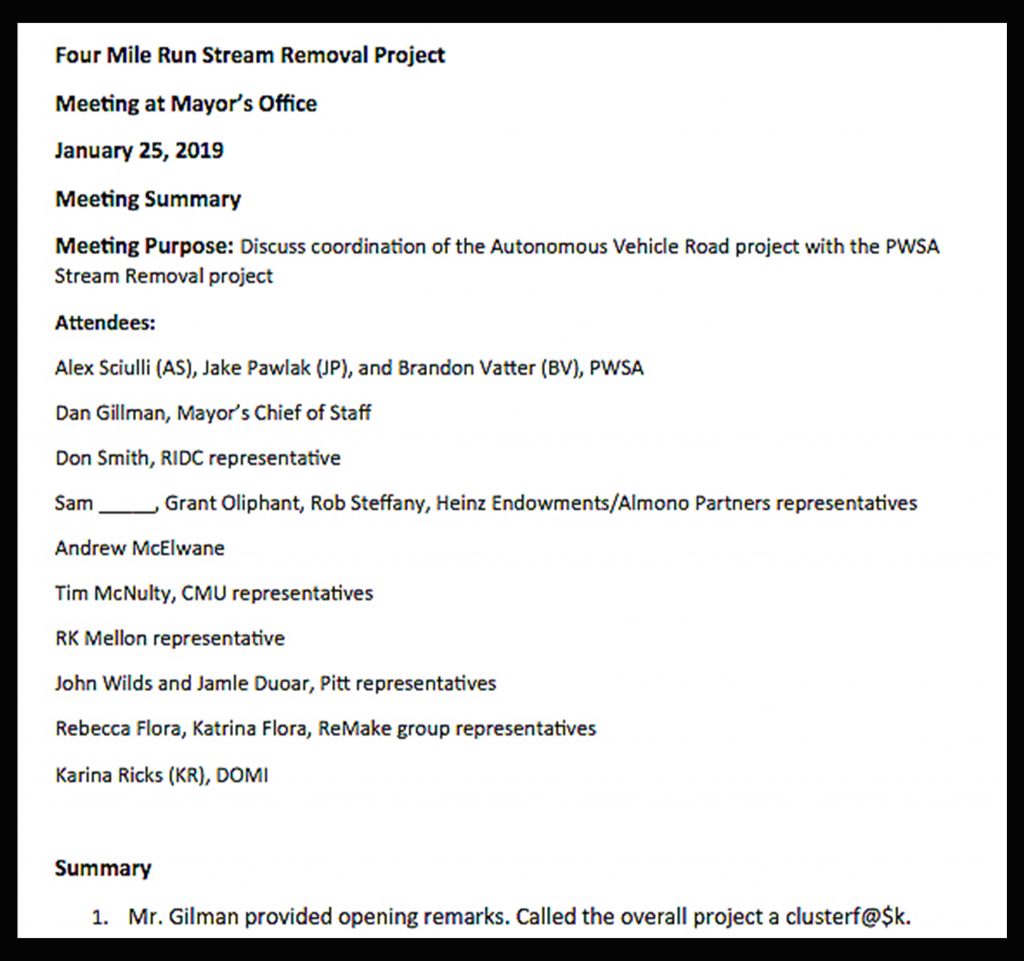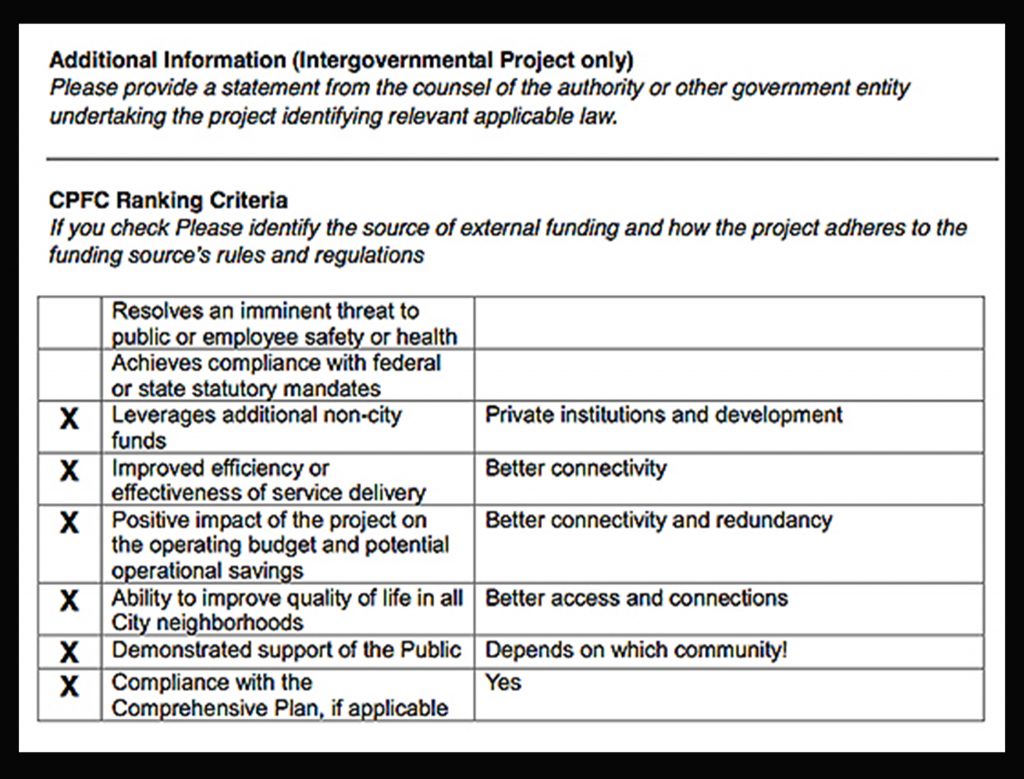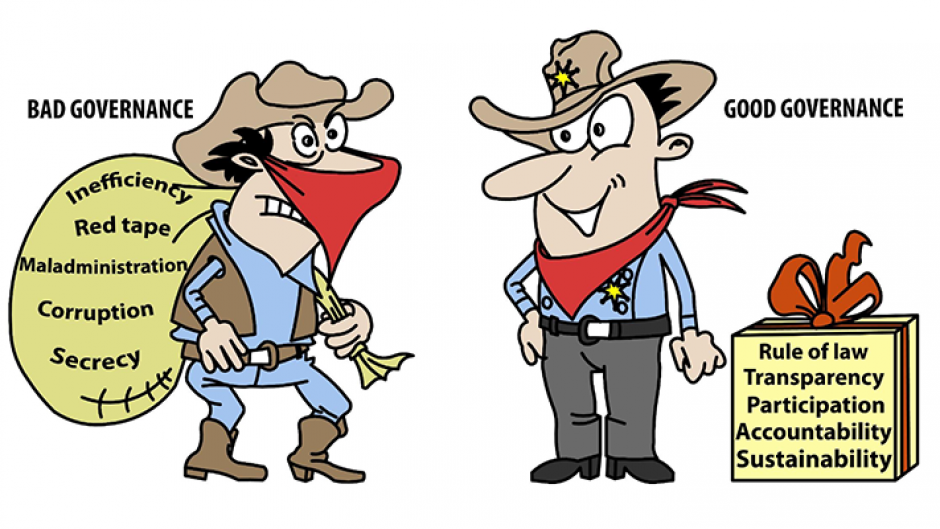And Some Answers Raise More Questions
Since 2018, residents of Four Mile Run (The Run) have filed several Right To Know requests with the City of Pittsburgh regarding the proposed Mon-Oakland Connector (MOC) project. City government eventually gave residents documents that were inadequate in fulfilling the RTK requests. Missing information includes up-to-date engineering documents and large portions of City departments’ correspondence with all private partners in the project. In the city’s response to the requests, they stated that they are not required to share any information, but would do so selectively. Furthermore, they added, “We are prohibited from forwarding records that reflect the attorney-client privilege or the attorney work product privilege.”
But a section of the PA office of Open Records Right–to-Know Law states:
Section 708 of the RTKL places the burden of proof on the public body to demonstrate that a record is exempt. In pertinent part, Section 708(a) states: “The burden of proving that a record of a Commonwealth agency or local agency is exempt from public access shall be on the Commonwealth agency or local agency receiving a request by a preponderance of the evidence.” Preponderance of the evidence has been defined as “such proof as leads the fact-finder … to find that the existence of a contested fact is more probable than its nonexistence.”
The City’s position raises the question: Who is the attorney and who is the client in this case? This is the very same claim that city government made while conducting its infamous secret Amazon deal. The details of that plan, now available after Amazon turned down the bid, reveal the reasons for the secrecy. Pittsburgh promised the world’s richest man one of the most generous corporate welfare giveaways of land and taxpayer money of any city in the U.S. Those promises included the MOC.
At the suggestion of the City of Pittsburgh, residents also filed RTK requests with the Pittsburgh Water and Sewer Authority (PWSA), the agency tasked with constructing the Four Mile Run Watershed Plan. The scope of this crucial and technically challenging project was to include fixing The Run’s worsening chronic flooding. But the City is forcing the merger of the MOC with PWSA’s plan. PWSA failed to respond to a resident appeal and the Office of Open Records in Harrisburg ordered PWSA to hand over all documents requested. Those documents contained crucial information including:
- Department of Mobility and Infrastructure (DOMI) Director Karina Ricks stating that the MOC is not a sufficient transportation solution and that other routes would have to be added. (The same alternative routes that residents proposed instead of the present route that would permanently degrade two communities and Schenley Park).
- A March 2019 engineering document that shows the permanent loss of approximately 7 acres of tree canopy if the MOC is constructed.
- Don Smith of RIDC saying, “Let’s get an imperfect connector road there now and more perfect long-term solution implemented later.”
- A Heinz Endowments representative saying “the connector road to Oakland is incredibly important. Developers have indicated their interest in the Almono site is contingent on the road being constructed.” (In other words, the roadway is a sign-on condition for potential HG developers/tenants, rather than a necessity that serves the affected communities.)
- Regarding the watershed project’s aim to fix The Run’s annual severe flooding problems, Alex Sciulli of PWSA states that “more cost-effective options may be to change the floodplain and purchase the affected properties.” (City officials have repeatedly stated they have no plans to attempt to acquire resident properties.)
- Mayor Chief of Staff Dan Gillman referring to the project as a “clusterf@$k.”

There is more evidence of non-transparency and duplicity by city government regarding the MOC project. Throughout the process, residents have demanded they be informed of what DOMI was planning and when DOMI would be filing grant proposals or other requests for funding. DOMI has refused to do so. They applied for a 1 million dollar grant for the MOC through the Southwestern PA Commission in 2018—while DOMI was holding a series of public meetings about the project. The money was approved, but DOMI failed to notify residents beforehand and afterward. Only dogged research and policing of the project by opponents flushed out the information.
Residents more recently received another document: a 2018 request from DOMI to the City Budget office for funding. That document is mostly blank, but DOMI was nonetheless given 9 million dollars of taxpayer money. One section of the document DOMI did fill out was the section reading: Please identify the source of external funding and how the project adheres to the funding source’s rules and regulations. “Demonstrated support of the public” was a question within that section. DOMI’s response: Depends on which community!

What else are city officials hiding and why? Why are they so determined to bulldoze through two vibrant neighborhoods and Schenley Park when they admit their proposed shuttle road is not a transportation solution and does not serve the affected communities? University expansion through a slow-motion land grab could be the answer.
Opponents of the MOC recognize this issue as much bigger than any individual neighborhood. Our growing coalition of residents, park protectors, neighborhood organizations and other concerned citizens is committed to protecting Pittsburgh’s communities from erasure.
(This article was previously published on February 1, 2020 in the Hazelwood Homepage)

Recent Comments